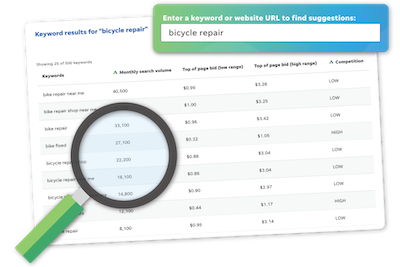Popular Keyword – Internet Keywords
Search Popular Keywords in Your Industry
These are the most popular suggestions for Internet Keywords generated by WordStream’s Free Keyword Tool. To get have all of these keywords sent to you, simply enter your Email address and click “Email Keywords” below.
Your keywords are on the way to your inbox!
Internet Service Marketing Tips and Tricks
Here at WordStream, we’re not experts on every single topic we write about. Construction, gardening, plumbing—just a few examples of things we’ve tackled on this site that could not be further from what we specialize in. We’ve managed to provide sound advice to companies in these industries, however, because we understand what unites all business owners: a drive to get the most out of a marketing budget.
But this time, we feel right at home. If there’s one thing the good people at WordStream understand, it’s the Internet. In fact, WordStream wouldn’t exist without the Internet. As such, we feel pretty confident about giving some online advertising pointers to internet service providers (ISPs). Without further ado, let’s get into it.
We’ve dedicated many a blog post to competition between rivals, but yeesh—does it get any more competitive than the Internet service market? There are a few ways to navigate this landscape.
One: competitive keyword research. Essentially, this tactic entails finding out what your competitors are bidding on and trying to beat them, either by placing higher bids or by earning a higher Quality Score. Assuming your pockets aren’t infinitely deep, it’s probably a good idea to go the Quality Score route—optimizing ad copy to drive higher click-through rates (CTRs), creating customer landing pages to make them more relevant, and so on.
Two: using social listening techniques to find your competitors’ dissatisfied customers and directly offering them better service. For example, through social listening, you can find tweets in which consumers complain about a particular rival of yours. As you can imagine, directly responding to these tweets with special offers or guaranteed perks is a super effective way to beat out the competition.
Let’s go a little deeper with something we brushed over: ad copy optimization. Copywriting is essential for digital marketers in every industry, and it’s particularly crucial when competition is between a few huge rivals. Competition necessitates differentiation, and ad extensions allow search advertisers to do just that. Use your ad descriptions to outline all the features and perks that make your company better than the rest. Do you offer round-the-clock customer support? Do you offer discounted prices for customers who sign longer contracts? Whatever it is that makes you special, make it prominent in your ad copy.
While we’re here, let’s talk about optimizing what comes after the click: your landing pages. Although clicks alone are valuable in terms of your ad rankings, they don’t mean all that much if they don’t lead to sales. Provide customer testimonials (either written or in video) to demonstrate to the prospect that people just like her love your product. You can create a sense of urgency by offering a discount or deal that only applies right now. Finally, above all else, make sure the messaging of your search ad carries over to the landing page. Otherwise, the transition from the SERP to your site is going to be jarring, which will not make the prospect want to buy.
Shifting gears, social media is another platform you can leverage to squash competitors. Internet service is a market of few players, and social media users love it when big brands duke it out—just look at the interactions between Wendy’s and McDonald’s on Twitter. We’re not suggesting that your company start throwing haymakers, but some light jabs here and there are a great way to give your brand some personality. When a 22-year-old graduates college, moves into his first apartment, and sits down to pick an ISP, he’ll probably remember those times your company’s tweets made him laugh. Humor goes a long way when it comes to capturing mindshare.
For more online advertising expertise, read the WordStream blog.
BUSINESS KEYWORDS
- Accounting Keywords
- Affiliate Keywords
- Auto Insurance Keywords
- B2B Ecommerce Keywords
- B2B Keywords
- Biotechnology Keywords
- Business Keywords
- Business Management Keywords
- Business Travel Keywords
- Construction Keywords
- Credit Card Keywords
- Debt Keywords
- Entertainment Keywords
- Finance Keywords
- Human Resources Keywords
- Insurance Business Keywords
- Internet Security Keywords
- Management Keywords
- Office Supplies Keywords
- Online Payment Solutions Keywords
- Software Keywords
- Startup Keywords
- Web Hosting Keywords
CONSUMER KEYWORDS
- Art Keywords
- Automotive Keywords
- Casino Keywords
- Cell Phone Keywords
- Computer Keywords
- Dating Keywords
- Ecommerce Keywords
- Electronics Keywords
- Email Keywords
- Fashion Keywords
- Golf Keywords
- Hotel Keywords
- Internet Keywords
- Jobs Keywords
- Law Keywords
- Mortgage Keywords
- Music Keywords
- Online Stores Keywords
- Pest Control Keywords
- Photography Keywords
- Plumbing Keywords
- Real Estate Keywords
- Restaurants Keywords
- Shoes Keywords
- Travel Keywords
- Wedding Keywords
FINANCE KEYWORDS
HEALTH & WELLNESS KEYWORDS
MISCELLANEOUS KEYWORDS
- Aerospace Keywords
- Agriculture Keywords
- Best Travel Keywords
- Coffee Keywords
- Dog Training Keywords
- Education Keywords
- Environmental Keywords
- Food & Beverage Keywords
- Forex Keywords
- Gifts Keywords
- Home Based Business Keywords
- Home Improvements Keywords
- Internet Games Keywords
- iPhone Keywords
- Jewelry Keywords
- Landscaping Keywords
- Legal Keywords
- Luggage Keywords
- Pharmaceutical Keywords
- Poker Keywords
- Retail Keywords
- School Education Keywords
- Solar Energy Keywords
- Transporation Keywords
- Women Fashion Keywords
- Work From Home Keywords

